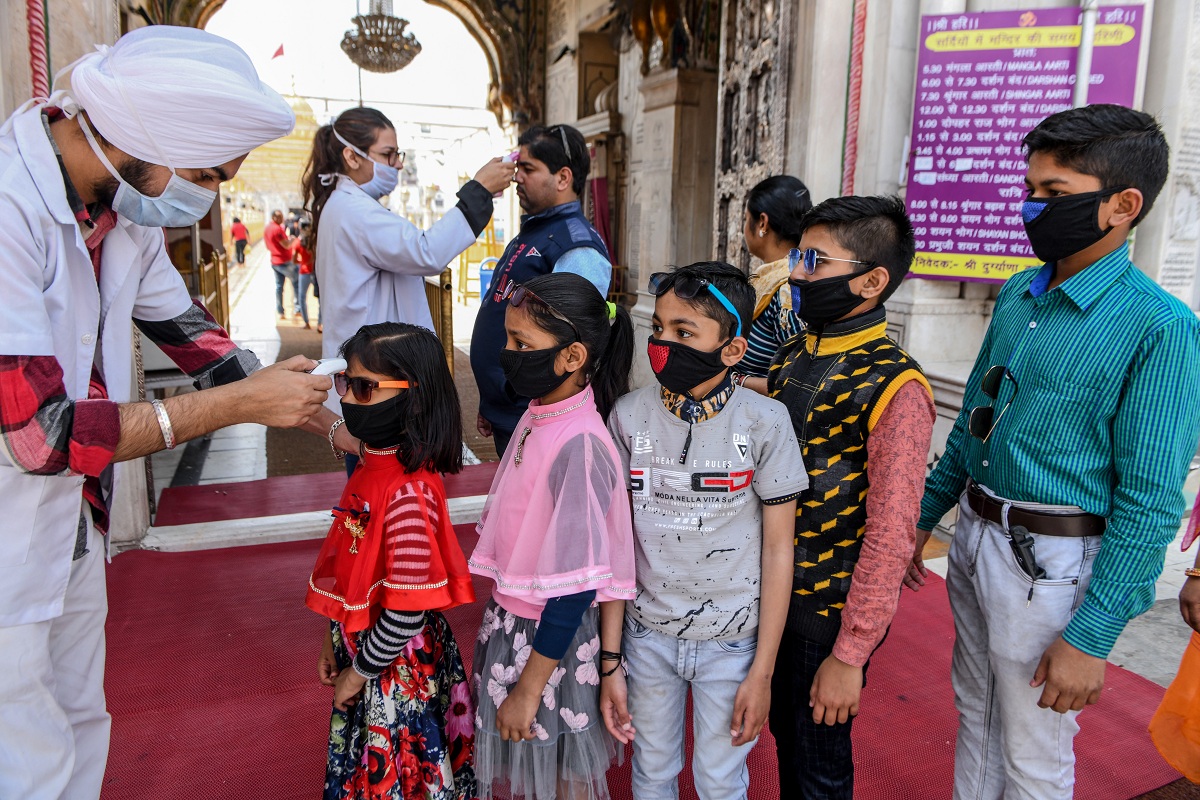Still unexplained
The hunt for the origins of Covid-19 has for the past four years been a tangled web of politics, power struggles, and international finger-pointing.
No doubt Covid-19 has changed the life of the common man already and will do so more in coming days if it is not contained.

Health workers (L and C) wearing facemasks check the body temperature of devotees amid concerns over the spread of the COVID-19 novel coronavirus, at the entrance of the Durgiana Temple in Amritsar on March 18, 2020. (NARINDER NANU / AFP)
If anybody thinks that the deadly coronavirus will go away soon, they are wrong. But the mess it will leave behind may take quite a long time to clear, particularly on the economic side because of its global impact.
No doubt Covid-19 has changed the life of the common man already and will do so more in coming days if it is not contained. Keeping up with the news that seems to be changing by the minute is daunting for the common man. Every Indian has to be cautious about himself or herself and make sure that they neither spread the virus nor catch it from others.
The question is how long should self-quarantine and other measures be taken. The simple answer is nobody knows. At a news conference this week, US President Donald Trump said, “People are talking about July, August”. The fear of the unknown continues and people should realise that everyone is a target, a potential host.
Advertisement
They must change the way they live. Because no one knows how the virus will play out or what the final human and economic toll will be, economists caution against concrete predictions. Meanwhile stock markets are bleeding, production will become less and supply chains will be disrupted. The tourism sector is seeing the most drastic hit, with flights, cruises, hotels and related businesses struggling.
While tourists will no doubt be eager to explore the world, they will have to wait to do so. As of now people will have to get used to precautionary measures like social distancing etc. If the pandemic spreads as it is threatening to, the consequences will be disastrous.
The threat is real with no chances of a vaccine available in the near future. Covid-19 has resulted in many changes to daily life. The first thing that has changed is self-imposed quarantine for many. This is very essential for the elderly and those with lung diseases.
The next two weeks are crucial and it is advisable for senior citizens to stay home and watch movies or read. Kids are also staying home because of the closure of schools. Many are following the new health regime of washing their hands with soap at least for 20 seconds and using sanitizers.
The sale of thermometers and disinfectants are going up to a new pitch and that of face masks has also climbed. In just a matter of days, people have got accustomed to wearing masks, stocking up on essentials, cancelling social and business gatherings, scrapping travel plans and working from home. Elbow bumps and Namaste have become the new form of greeting replacing hugs, handshakes and pecks on the cheek.
Trump has adopted our “Namaste”. Some others have started bowing to each other. “We need to exercise abundant caution to contain the disease. People are advised to stay away from gatherings,” Delhi chief minister Arvind Kejriwal said recently.
Delhi government has imposed a ban on gathering of more than 20 people with the result all public functions, social events, sports events, entertainment etc. have been banned. Movie halls, clubs and malls also have closed down for the next two weeks.
The Delhi government as well as the Union Government have done an excellent job by creating awareness among the masses. Prime Minister Narendra Modi’s address to the nation on Thursday evening cautioning the public not to expect normalcy any time soon and his advice on following cautionary measures taken by his government and his public appeal to adhere to them have gone down well.
It is hoped that habits formed due to these restrictions might endure long after lock downs ease. Public health officials say a vaccine won’t be ready for widespread public use for at least a year to 18 months, taking us well into 2021. India is currently tackling its second stage of the outbreak and the government is working in full swing to curb its impact.
The Indian Council of Medical Research (ICMR) warned last week that India has 30 days to limit stage III (infection spreads through the community, just before it becomes an epidemic). These are indeed crucial days and every one must join the fight against the virus.
The onus of fighting the deadly virus is not only on the government but also on citizens. Lessons of earlier epidemics like SARS, Ebola and Chickengunia have left us better prepared to fight the virus. But complacency is not a luxury India can afford.
Advertisement